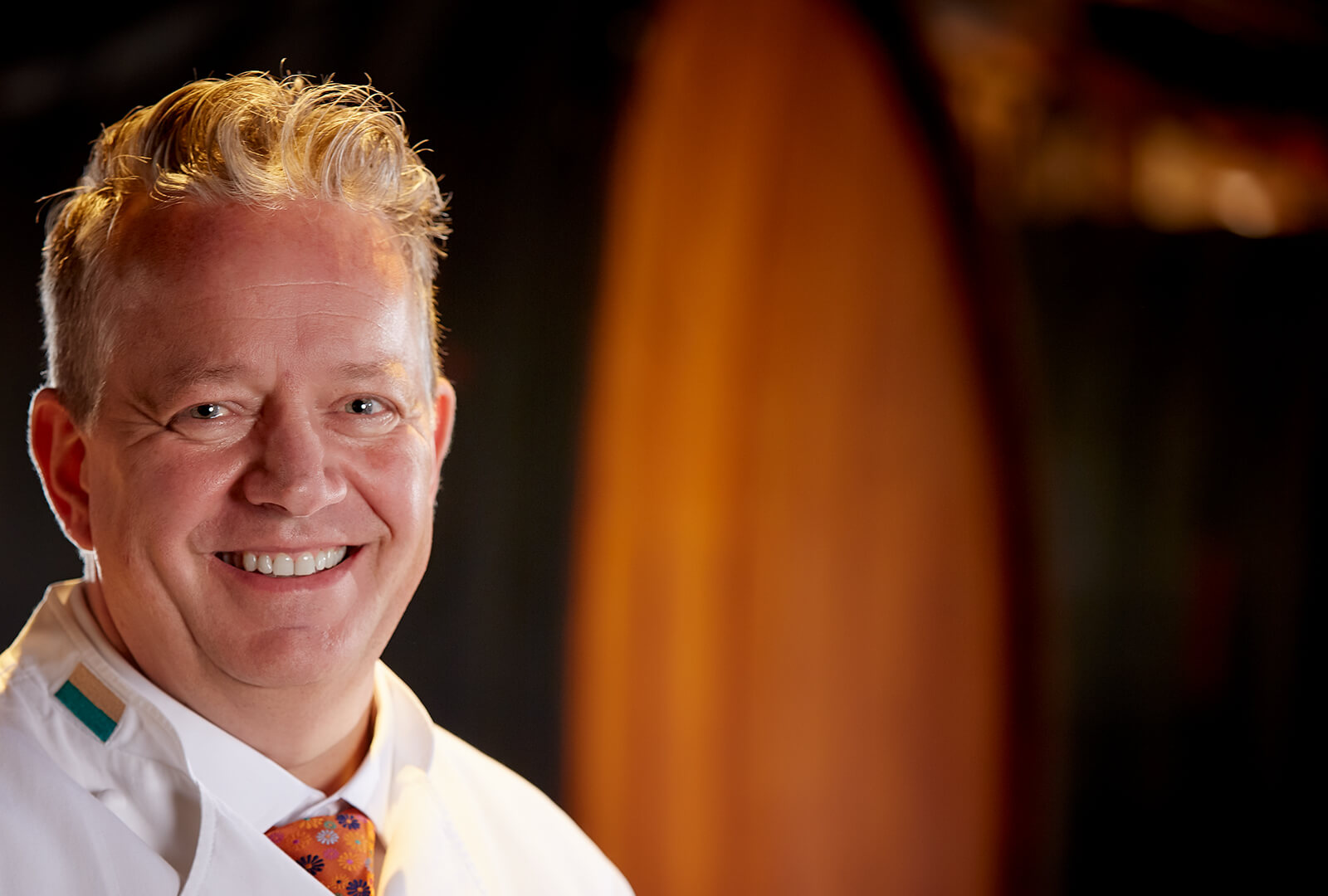The view from the Greystone campus of The Culinary Institute of America is breathtaking. It’s 8 a.m. and dewy morning light is cascading over the foothills in St. Helena, about twenty miles north of Napa. Grapevines trace the valley in geometric lines, and somewhere a mower hums between the rows, releasing the crisp smell of cut vegetation into the air. It’s picture-perfect, except for one little bit of trash that doesn’t escape the notice of Master Chef Adam Busby. He is impeccably put together, in slacks and a floral tie. His silver hair is combed back neatly at the sides, framing bright blue eyes that intensify his look of alertness.
Busby bends to pick up an errant cellophane wrapper and holds it up as an object lesson.
“This piece of garbage is the same as a fingerprint on a plate,” Busby says, referring to a major fine-dining no-no. “I can spot one of those from a mile away.”
When plates leave the kitchen, chefs make sure they’ve left no evidence of their work that might detract from the perfection of the dish — just one of a thousand little things aspiring chefs must learn. It’s Busby’s job to see the things other people don’t notice, but that make the difference between adequacy and excellence.

Chef Adam Busby participates in a Master Chef roundtable at the Culinary Institute of America .
It’s this attention to detail that earned Busby worldwide recognition as a chef, helping him work his way to the level of Certified Master Chef in 2004, and it’s why he’s the general manager of CIA’s Greystone campus.
“Good afternoon, Chef.” Busby is greeted with respectful nods and salutations as he passes students and colleagues in Greystone’s echoing stone and timber halls. His current role on campus isn’t just the details, but also the big-picture issues — a combination of problem-solving and people management. After doing a morning lap around the campus — noticing the fingerprints — Busby says he settles in to look at what needs fixing. Considering Greystone is a grand old building from 1889, things break daily. When no one else can solve the problem…
“It’s always ‘Let’s go ask Adam,’” he laughs. “I get the stuff no one else can figure out.”
Seeking Fortune Abroad
It’s not unusual for cooks to feel passionate about food, but it takes a great deal of hard work and certain amount of risk to turn that passion into a fulfilling career. Busby was a young man when he was told that to really make it as a chef he had to go work in France. Taking the advice to heart, he immediately sold most of his belongings and bought a one-way ticket to France. “I thought, yeah, I’m gonna make a go of this,” he recalls.
Busby arrived with two chef coats, his chef’s knives and a Michelin Guide. He bought a Europass and traveled around France, visiting two- and three-star restaurants until he found a job. It took a while, but his gamble paid off. All told, he spent a couple of years in France learning from the great chefs of the day.
It wasn’t easy. He remembers waking up at 3 a.m. to make croissants and baguettes during a pastry internship, and the long and tedious hours prepping in famous kitchens. Those experiences taught him more than cooking techniques, though. He gained valuable insight into what sort of person has the makings of a great chef.
“There are two types of people,” he says. And then, Master Chef that he is, he tells a story about carrots.
It’s a parable, really, about two young cooks who have been assigned carrot prep. Each day, they spend several hours, sometimes a whole shift, cleaning and peeling and chopping carrots. One apprentice chef simply takes his lumps, settles in, and grudgingly does the drudgery for several hours. The other opts for a different approach. He takes the opportunity to optimize procedures, coming up with personal best practices for precision and efficiency. He learns everything there is to know about carrots, and quizzes himself on retention by teaching his fellow apprentice. The guy who takes every task and turns it into an opportunity for learning and self-improvement, Busby says, “That’s the guy who’s gonna make it.”
Broadened Horizons
How and where CIA students make a difference in the culinary world has changed over the years. Becoming a head chef is no longer the only goal.
“If you were to poll the average class that’s here at the CIA and say, ‘Raise your hands if you want to open a restaurant in the future,’ a decade ago pretty much everyone would put their hand up,” Busby says. “Now I would say less than half the class will put their hand up.” Students today have wide-ranging ideas about what they’ll do after they leave campus, from food writing to photography to working on cruise ships or developing nutrition bars. Instead of simply funneling hopeful chefs into restaurants, culinary school is now a key that unlocks many doors.
He was 13. It wasn’t just the food that made an impression — it was the whole experience, from the repurposed historical space to the sense of the unknown.
The evening had a lasting effect. Busby still has a keen sense of how big-picture planning and attention to seemingly insignificant details — every step, from years of toiling in kitchens to picking up a single piece of garbage on the sidewalk — can add up to something extraordinary.
